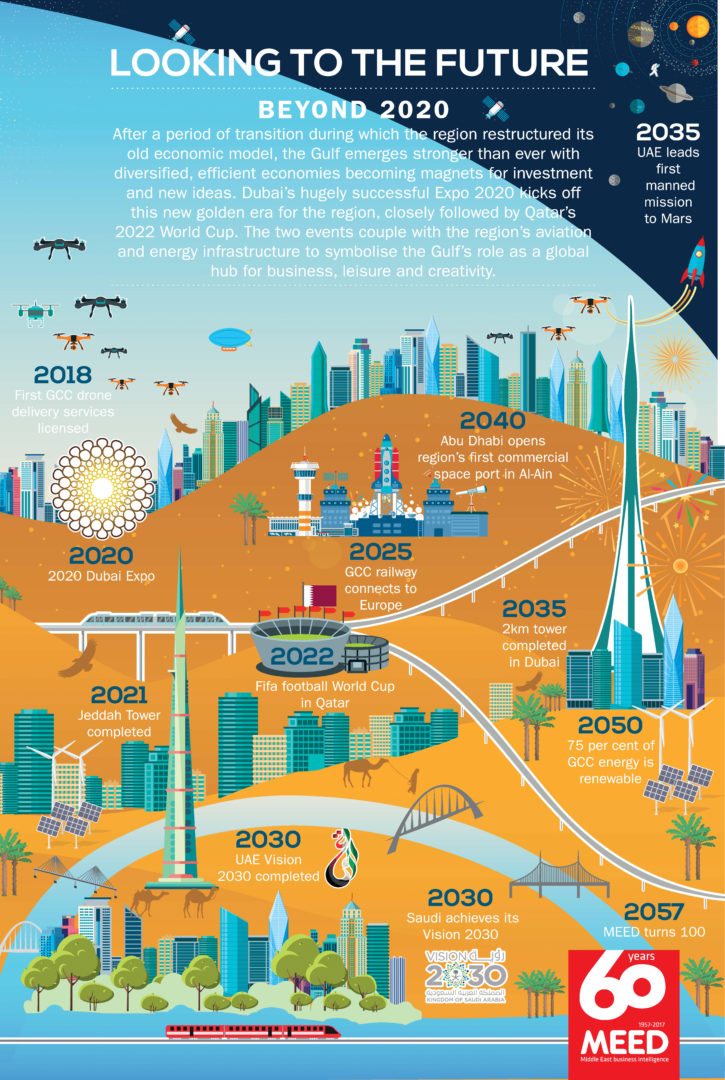

After a period of transition during which the region restructured its old economic model, the Gulf emerges stronger than ever with diversified, efficient economies becoming magnets for investment and new ideas. Dubais hugely successful Expo 2020 kicks off this new golden era for the region, closely followed by Qatars 2022 World Cup. The two events couple with the regions aviation and energy infrastructure to symbolise the Gulfs role as a global hub for business, leisure and creativity

MEED Beyond 2020 infographic
MEED Beyond 2020 infographic
By 2020, strong growth has returned to the Gulf as transformational economic reforms triggered by the oil crash of 2014 begin to deliver results and a new golden era is kicked off by Dubais Expo 2020.
The collapse of oil export revenues forced the complete restructuring of the traditional economic growth model driven by government spending. A new model based on private sector productivity, creativity and diversification emerged that proves to be far more sustainable and fairer for business, yet still benefits from the drive provided by clear leadership visions. As a result, the New Gulf region becomes a magnet for new ideas and investments from people who appreciate the regions ability to act quickly on plans.
In 2020, the regional economy is still underpinned by abundant, low-cost hydrocarbon reserves, but it is no longer dependent on them. The drive to conserve valuable hydrocarbons leads to the wholesale reform of the energy sector that started in 2015 with the removal of costly energy subsidies and continued with the drive to become the worlds centre for alternative energy research and investment.
Driven by its Renewable Energy Project Development Office (Repdo), Saudi Arabia becomes the regions biggest generator of green energy by 2023, with 9.5GW of renewable energy generation capacity installed. The UAE is also a major centre for new energy with some $272bn of energy investments planned by 2050. As a non-oil producer by 2020, Dubai has the Gulfs highest proportion of clean energy.
Another key transformation is the widespread digitalisation of government operations. By 2020, the Gulf is home to some of the worlds most efficient and interconnected transport networks. Smart electricity grids enable improved management of consumption, while digitalisation optimises the asset performance of factories and utilities.
The demand for data and technology skills supports the reform of the education sector, encouraging a focus on science, maths, technology and the creative arts. A new generation of highly skilled designers, scientists and engineers go on to aid the further diversification of the regions economy. But perhaps the most important result of the 2015-20 transformation is the expansion in business start-ups, particularly in the digital space.
You might also like...

Rainmaking in the world economy
19 April 2024

Oman receives Madha industrial city tender prices
19 April 2024

Neom seeks to raise funds in $1.3bn sukuk sale
19 April 2024

Saudi firm advances Neutral Zone real estate plans
19 April 2024
A MEED Subscription...
Subscribe or upgrade your current MEED.com package to support your strategic planning with the MENA region’s best source of business information. Proceed to our online shop below to find out more about the features in each package.








